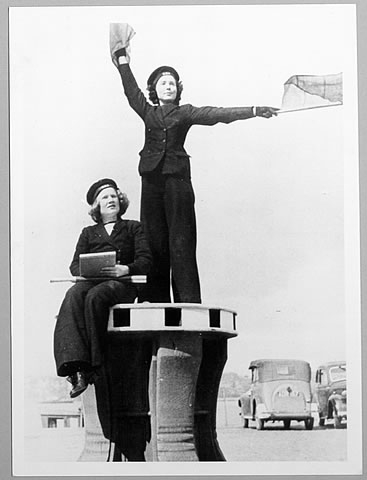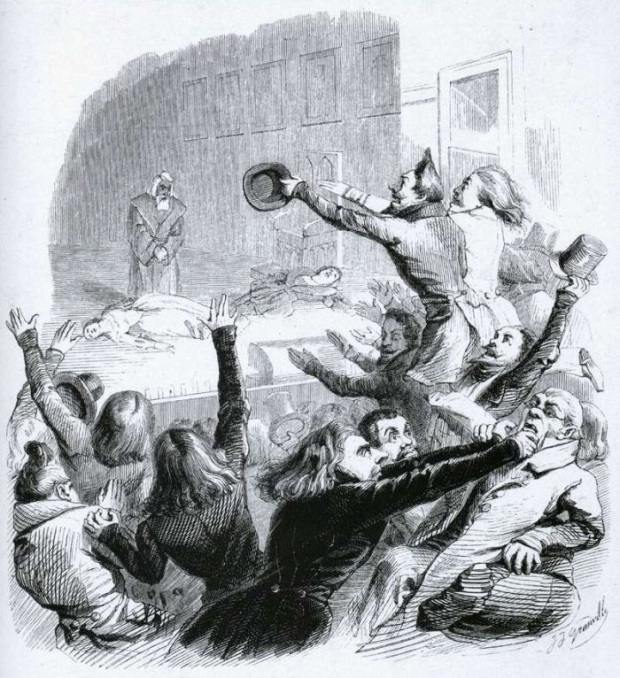Does the Audience Need an Outlet? (Part II)
On smartphones, LuPones, and unanticipated interactivity.
This is Part II of Michael Feingold's latest "Thinking About Theater" column.
Click here to read Part I.

(© Joan Marcus)
"There is another world," said the mystical poet and playwright W.B. Yeats, "but it is in this one."
Yeats, who died in 1939, probably wasn't foreseeing the multifaceted Internet world that smartphones and other handheld electronic devices open up for us, nor was Patti LuPone pondering the expansiveness and variety of that world when, in early July, she sparked a minor media sensation by gently removing a cellphone from the hands of an audience member who'd been busily scrolling during a key scene of LuPone's performance in the current Shows for Days at Lincoln Center's Mitzi E. Newhouse Theater. LuPone, who has expressed herself strongly on the subject of intrusive cellphones on previous occasions, was simply trying to do what any actress worth her salt would do: make the audience pay attention.
This challenge, central to the art of live performance, naturally isn't new; today's little Wi-Fi receptors have simply altered the scope of its playing field. Recalcitrant audiences, sleepy audiences, talkative audiences, actively hostile audiences, distracted audiences, and peremptorily demanding audiences make up a large continuing element in theater history, and anecdotes about their obnoxious behavior abound. I recently had to research, for a play about the 18th-century Shakespeare forger William Henry Ireland, the disastrous opening night of his Vortigern. Compared to the audience's appalling behavior on that occasion, the glare of texting and the tinkle of personalized ringtones are about as troublesome to actors as an Equity day off.

"The drama's laws the drama's patrons give," Samuel Johnson wrote, in a verse prologue to be spoken before a friend's play, "And we, who live to please, must please to live." For most of the 18th and the first half of the 19th century, in England and America, the audience ruled the theater, and they ruled it damn arrogantly. One result was that respectable middle-class people simply stopped going to the theater, until Queen Victoria's accession to the British throne brought about a general curbing of public rowdiness. Another was that playwriting sank to a painfully low level, stooping to the cheapest tricks in its attempt to "catch" the house: It's not an accident that the long stretch between the satirical heyday of John Gay and Henry Fielding in the 1720s and W.S. Gilbert's advent in the 1860s provides almost nothing worth rereading or reviving: one comedy by the team of David Garrick and George Colman, two each by Oliver Goldsmith and Richard Brinsley Sheridan, a few mildly farcical pieces by John O'Keefe, and, in the 1840s, some viable melodramas by Dion Boucicault and T.W. Robertson. Slim pickings — the result of adhering to the laws "the drama's patrons" laid down.
The rather tenuous saving grace of audience rowdiness was that at least it constituted a response, however arbitrary or petty, to the performance in progress; at best it could function as a kind of criticism. Probably my favorite anecdote in this category occurred in San Francisco in the era before the Trans-Continental Railroad, when goods mostly came to the city by ship, so everyone in town knew the semaphore code that indicated what vessels were entering the harbor. At this time, there happened to be a notably hammy actor in the local stock company. One night, at the climax of a scene, he struck an excessive pose — left arm straight out at his side, right arm, perpendicular to it, straight up in the air — as he shouted the line, "What does this mean?" And the entire audience shouted back, "Side-wheel steamer comin' in."
LuPone's combative stance toward cellphone interruptions, while rousing tremendous support, has also provoked objections, which fall into two categories. Some see it as a symptom of the theater's refusal to adjust to contemporary life, with its ever-expanding electronic presence. Others, steeped in the pre-20th-century tradition of give-and-take between actors and audience, see it as a sort of dereliction of duty. It's the performer's obligation, they assert, to respond to the audience's reaction, not to hector them about it or discipline them for it.
Both arguments seem to miss the point. Certainly, smartphones and other electronic gadgets occupy an increasing importance in our lives, but that doesn't give their owners the right to make a public nuisance of themselves, which they do in many places other than theaters. Before condemning LuPone, ask yourself how many times this week you've had to come to an abrupt halt, while crossing the street or hurrying down a subway staircase, because the person in front of you suddenly stopped to check his or her e-mail, just as oblivious to place and time as if he or she were doing so at a theater during a performance.

And putting the argument in that context also reveals why those who link unbridled cellphone use to the rowdiness of a vaudeville or melodrama audience are drawing a false analogy. The public that shouted, catcalled, and occasionally threw things at the stage was, in its obnoxious way, present at the performance. It had not wandered off electronically to live a virtual life of its own, inconveniencing everyone around it, actors and theatergoers alike, who had assembled to share an experience in three dimensions. Such experiences can, and no doubt will at some point, be structured to include the little electronic nuisances to which we have all grown so attached. But meantime, the stage is still a living space, where actors relate to each other and to a group of live observers.
I've been at many plays where audience members felt compelled to shout back at the actors, and no one ever objected, as long as the noise they made showed that they were responding to the performance. People who delve into the displays on their glaring cellphone screens while a performance is in progress aren't responding to anything except their own narcissism. I put them in a class with the wealthy dowager who invited Mark Twain to be a guest in her box at the opera, and then chattered away all through the performance. When it was over, she turned to the eminent author and said, "I've so enjoyed having you as a guest tonight. Won't you come again next week? The opera will be Carmen." "I'd love to," Twain replied graciously, "I've never heard you in Carmen.

(© Joan Marcus)
Michael Feingold's next two-part "Thinking About Theater" column will appear on consecutive Fridays August 28 and September 4.
Michael Feingold has twice won the George Jean Nathan Award for Dramatic Criticism, most recently in 2015 for his "Thinking About Theater" columns on TheaterMania, and has twice been a finalist for the Pulitzer Prize in Criticism. He serves as chairman of the Obie Awards and has also worked as a playwright, translator, and dramaturg.








